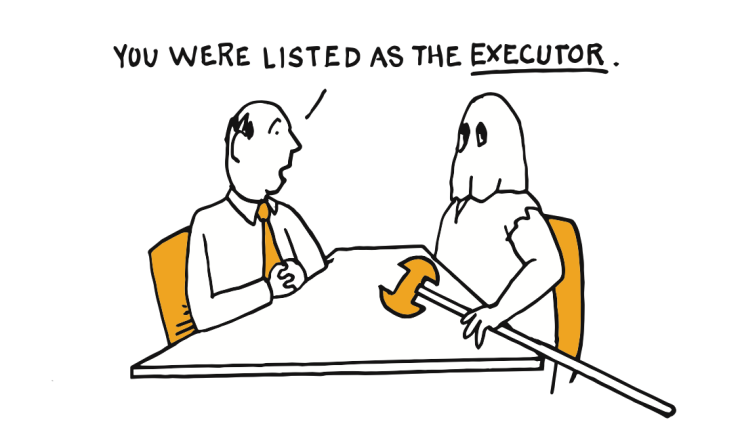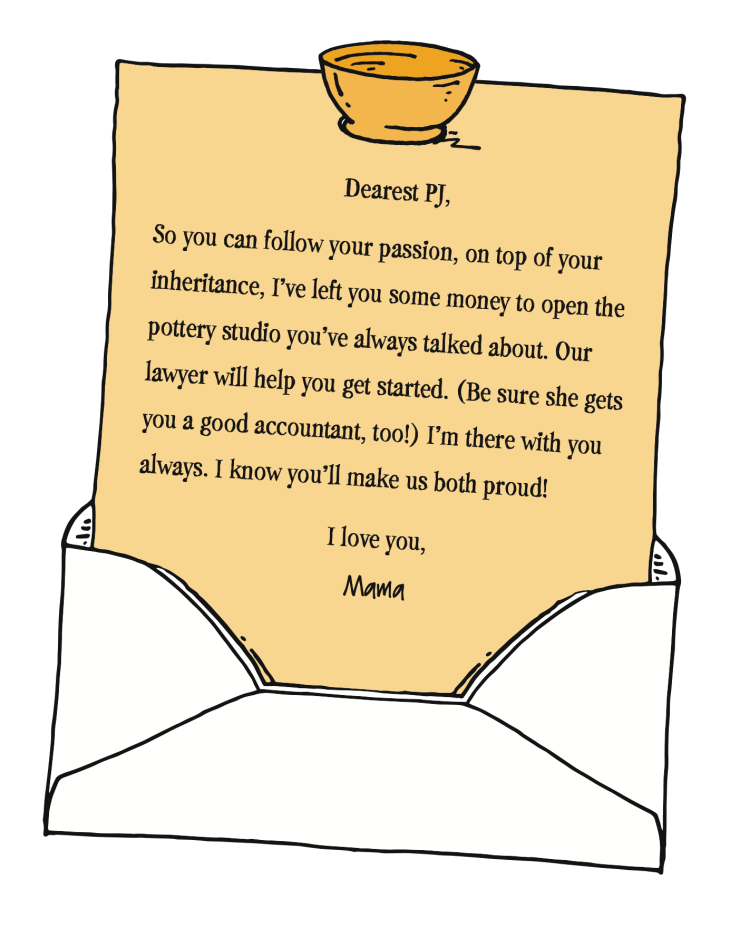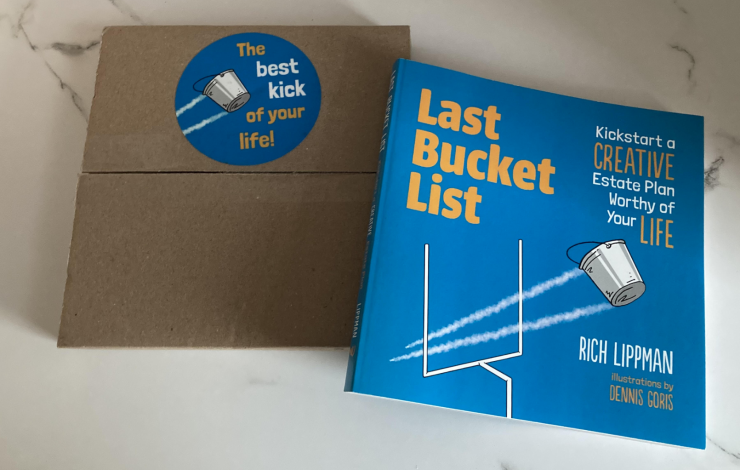Financial planning around your own death isn't most people's idea of fun.
A new illustrated humor book wants to help advisors change that for clients.

Author and humorist Rich Lippman has partnered with illustrator Dennis Goris to create "
"Last Bucket List," published Dec. 4, comes as many Americans lack an estate plan. A survey by Caring.com earlier this year, which was conducted by YouGov, found that
READ MORE:
Yet if a person dies intestate, or without a valid will, in many cases heirs will have to go through the state probate system to claim their assets (making a will by itself may not avoid the probate process, though it can simplify it). That could consume thousands of dollars and take many months to resolve, although the rules of inheritance and probate vary by state. Those the deceased leaves behind will have to deal with expensive legal and administrative headaches, while grieving, that may ultimately leave them a smaller share of what their loved one intended them to have. Failing to leave behind instructions for end-of-life wishes could trigger confusion, guilt or quarrels among heirs who are unsure what the deceased would have wanted.
Rethinking estate planning as acts of love
Lippman is betting that most people, if given the chance to rethink estate planning as an opportunity to express their love for others beyond the grave, would embrace it.
His own grim experience with estate planning gave him the idea for the book, which he came up with in the months leading up to the COVID-19 pandemic.
In a meeting with an estate planning attorney, Lippman realized he was "totally unprepared" for the conversation, he recalled in an interview. "She looked me in the eye and just matter of factly said, 'So Rich, when you die….' And I don't remember hearing what she said after that." Lippman was in shock thinking about those words.

"Right at that moment, I thought to myself, I'm not having fun," he said.
He went home, and after failing to find much on estate planning that was fun or uplifting, decided to create his own book to fill the void in the marketplace. Fun can draw people into a topic, but it can also engage them there more deeply, Lippman said.
"Because fun leads to inspiration, which leads to meaning, which leads to love. That became the foundation of the book."
READ MORE:
The book comes in a custom box with a cheerful blue sticker and a cartoon bucket on it promising "The best kick of your life!" The book inside has an equally blue cover with a bucket sailing through a football goal post. It reflects Lippman's positioning of the book as a kick in the pants for readers, but also an invitation to see estate planning as a game they can win.
Inside the front cover, a cartoon couple on a plane chat about making their will, which the woman has been nagging her male partner to do. He thinks, "Oh not this again."
When the reader turns to the next page, the same couple is jolted in their seats. Oxygen masks are dropping, the plane is shaking and it looks like the end might be near. Turning to the next page, the reader finds the same couple still alive. Everything's seemingly back to normal — but the man is nervously reconsidering his partner's words from a moment ago.

It's an attention-getting opener, reminding readers that one's last moment on Earth could come at any time.
"A lot of people, when they hear … it's about estate planning, they think it's going to be a heavy read," Lippman said. But quirky, charming illustrations can help convey complex ideas behind estate planning in a digestible way.
The book acknowledges that "some of you will stop reading here" in its opening, but its 200-plus pages are easily readable in one sitting, thanks to those images. Illustrator Goris uses cartoon elephants, smiling pickles, deep-sea treasure divers, bowling pins, rockets and flowers to keep readers' attention as Lippman breaks down the drier elements of estate plans into entertaining concepts.

Lippman suggests several ideas that planners can ask clients about, such as naming their personal "superheroes" (such as power of attorney), coming up with innovative burials for their funeral, protecting their online files and accounts in a "digital will," or writing letters (he calls them "missions of meaning") that empower heirs to carry out specific good deeds or projects on their behalf.
"A lot of people have told me since the book was published, that they don't want to go out with a whimper. They want to go out strong. They want to go out in a way that reflects how they lived," he said. "The whole idea is to almost create an encore for yourself."
A mission of meaning in action
Reception from financial advisors and their clients has been "overwhelmingly positive," said Lippman, who's written "a lot of marketing copy" for the industry over the years.

Lippman's book is being published by NewTwist.Press, an independent publishing company he runs with his wife, Lisa. In an unusual marketing choice, the book is available for ordering off the website he created for it — not on Amazon, as most books are. Lippman said he is hoping professionals will order the books for client gifts.
Lippman funded publication of "Last Bucket List" with assistance from an investor who asked to remain anonymous, he said, and, fittingly, with funds from Lippman's inheritance that his parents left for him to use on meaningful projects.
"I'm honored to have seen it through," he said of his parents' intentions.










